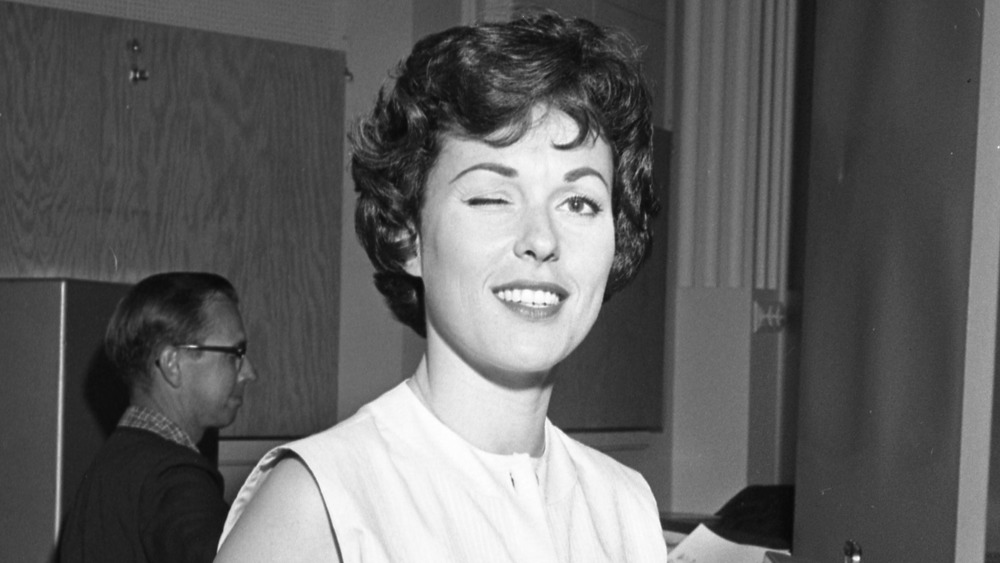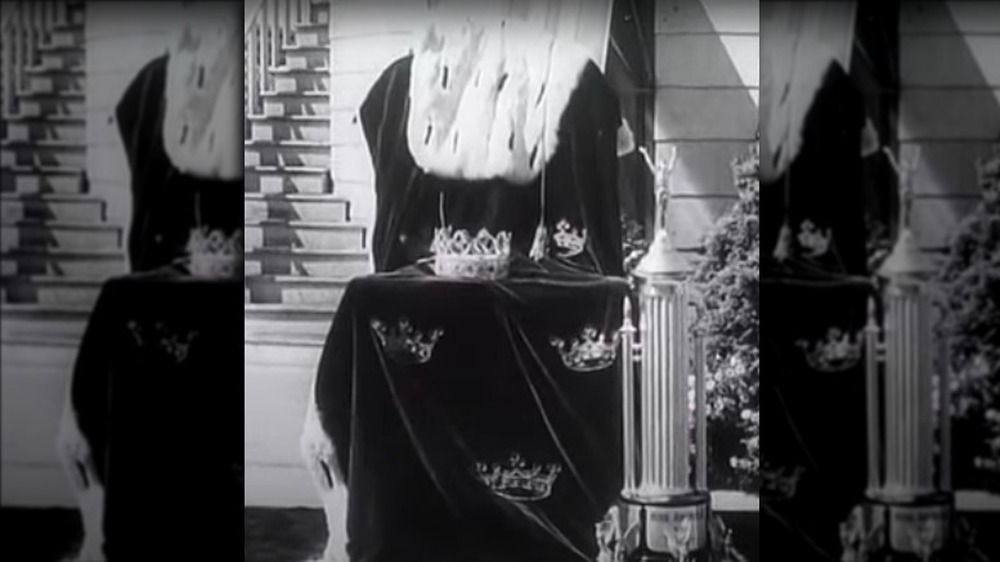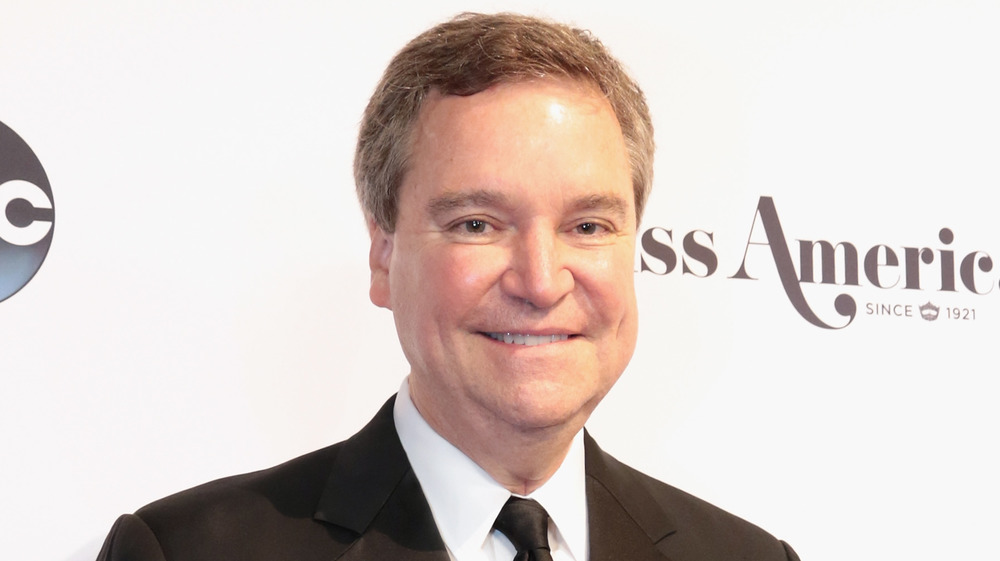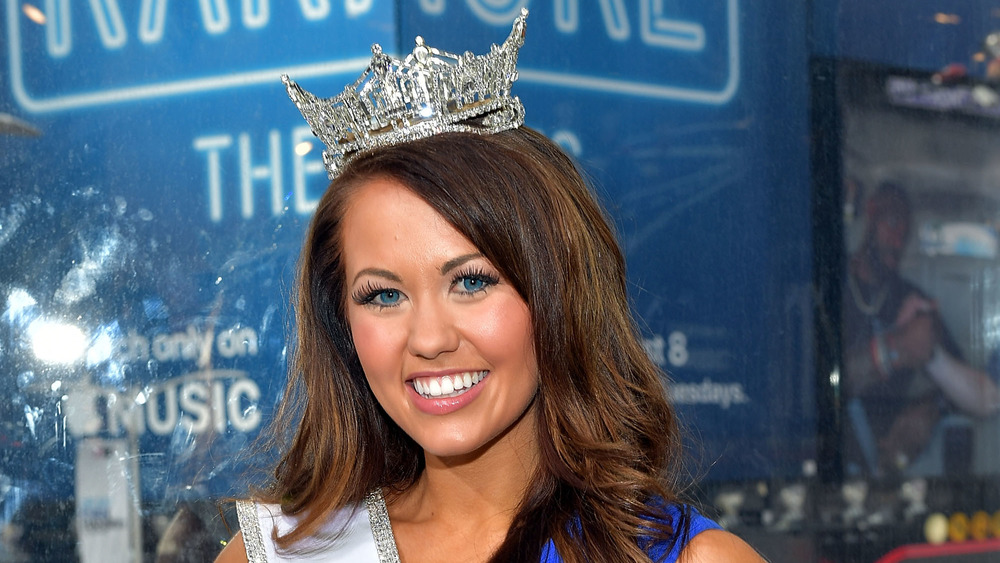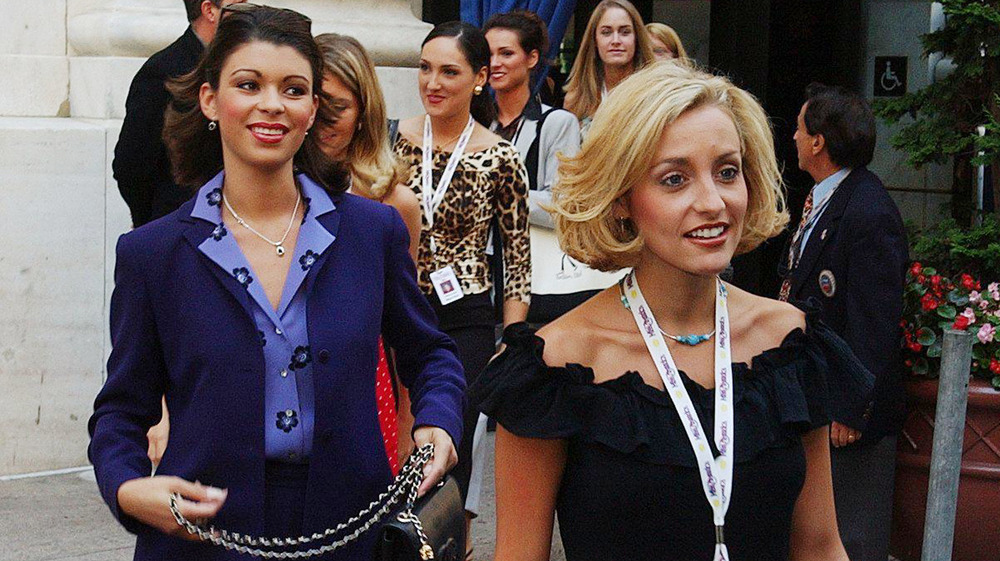The Dark Truth About Being Crowned Miss America
It's a 100-year-old institution and the world, particularly the notion of a woman's role in Western society, has changed a lot since it started, but winning the Miss America pageant is still a remarkable, singular achievement that can propel an average woman in her early twenties to overnight stardom. Although, to be honest, those who compete for and win the title of Miss America are anything but average — they're driven, high-achieving, telegenic, and they defeated a slew of other exceptional success stories from affiliated competitions in their own states to even get to the biggest and most famous pageant in the country. Among the many notable women to have worn the Miss America crown and sash are pop singers (Vanessa Williams), actors (Lee Meriwether), and TV journalists (Gretchen Carlson).
It's all happy crying and congratulatory deference when Miss America wins, but that glamorous veneer belies an organization and pageant subculture that's got big streaks of malfeasance, toxicity, and seediness. Here's a look into the dark side of Miss America.
Only white women were allowed to be Miss America for decades
The first woman to win the title of Miss America, Margaret Gorman, was crowned in 1921. Like all other Miss Americas for the next six decades, Gorman was a white person — if she and the other crown-wearers for the pageant's first 30 years had not been caucasian, they wouldn't have been allowed to win, or even compete. According to PBS's American Experience, the Miss America pageant officially codified its racially exclusionary policy in the 1930s. Rule number seven in the pageant's book of directives said that "contestants must be of good health and of the white race." Until 1940, contestants had to include in their application their family's ethnic heritage as far back as it could be traced.
Even after the Civil Rights Movement of the 1950s and 1960s, Miss America was slow and resistant to recognize Black women. The first African-American to compete was Cheryl Brown (above) in 1970, while a Black woman wouldn't be named a top 5 finisher until Lencola Sullivan did it in 1980. Vanessa Williams, of course, would be the first Black woman to wear the Miss America crown in 1984.
But who were the first Black women to participate in a Miss America pageant? In the 1923 iteration, a few African-American women appeared onstage in a musical number portraying slaves.
Miss America officials asked Bess Myerson to hide her Jewish background
While Black women, and women of color, were barred from the Miss America pageant in the 1940s, members of the also discriminated against Jewish community were ruled white enough to be eligible to compete. Bess Myerson, who came from a Russian-Jewish background, won the title of Miss America 1945, according to PBS's American Experience, despite alleged vocal and explicit reservations by pageant director Lenora Slaughter. The executive asked Myerson to change her name to Beth Merrick, so as to hide her ethnicity. Myerson refused. "It was the most important decision I ever made," Myerson told the Jewish Women's Archive. "It told me who I was, that I was first and foremost a Jew."
Myerson also received hostile pushback while performing her duties as Miss America. Three of the five sponsors of her post-victory national tour pulled out, and she was offered far less personal appearances than previous winners. One country club, which had booked the Miss America winner before she was crowned, cancelled the engagement when Myerson emerged victorious.
As of 2021, per The Jerusalem Post, Myerson remains the only Jewish woman to ever be crowned Miss America.
Bette Cooper didn't want to be Miss America after all
Nowadays, going for the Miss America title is a specific, viable, and extremely competitive trajectory for young women looking to score some lucrative scholarships, a launchpad to fame, or both. In the 1930s, it was possible for a woman to become Miss America almost by accident. This happened to Bette Cooper, who quickly realized why she hadn't given much thought to pageant life earlier, because she found that being Miss America was stifling and deeply uncomfortable.
According to the New York Post, 17-year-old Cooper went to the Bertrand Island amusement park in the summer of 1937 the night it hosted a pageant, with the winner possibly going on to the Miss America pageant. Cooper entered on a dare from her friends, and she won, and was eventually crowned Miss America, too.
Hours later, when the magnitude of it all hit Cooper, she freaked out. With the help of Louis Off, her pageant-assigned chauffeur, she snuck out of her hotel in the middle of the night via the fire escape and made her way back home. Cooper failed to show up for Miss America events the next day (the Movietone newsreel screenshot shown above features the strange image of her crown being placed on an empty throne), leading angry pageant officials to issue various threats to Cooper if she didn't play ball. She dutifully served out her reign and retired to a private life, never again appearing as part of a Miss America event.
Yolande Betbeze bucked this longtime Miss America tradition
Miss America has long presented itself as a scholarship contest and a celebration of well-rounded women, recognizing the brightest, most talented, and most promising college-age ladies in the country from whom the country can expect big and impressive things in the years to come. None of this gels with the fact that until 2018, the Miss America pageant included a swimsuit portion. Every year, contestants would walk across the stage in a one-piece or bikini, strongly suggesting that Miss America was really about looks, female objectification, and enforcing rigid standards of beauty and weight.
Yolande Betbeze, Miss America 1951, was the first to question the necessity of the swimsuit factor. While she competed in and won the swimsuit portion, according to the The New York Times, Betbeze refused to participate in the standard Miss America activity of making public appearances in a bathing suit on a cross-country tour, sponsored by swimwear company Catalina. "I'm an opera singer, not a pinup!" was her official reason why.
That so upset the management at Catalina that they withdrew as a sponsor of the Miss America pageant completely. The company was so miffed that they helped organize and fund a rival pageant, Miss USA, which would proudly and unabashedly celebrate contestants in swimsuits.
The first Black Miss America was forced to resign
A few Miss America winners have gone on to be famous for other things, and there probably isn't a title holder better known than Miss America 1984, Vanessa Williams. As an actor, she starred in movies including Eraser and Soul Food, and earned three Emmy nominations for her Ugly Betty. As a singer, Williams racked up a string of '90s hit singles, including "Love Is," "Save the Best for Last," and "Colors of the Wind." Hers is also a comeback story, as Williams was the first (and so far only) Miss America to resign, per History.
In July 1984, Penthouse announced that it would publish nude and sexually provocative photos of Williams, which she'd posed for two years earlier while serving as a photographer's receptionist, according to Time. At the time, Williams had believed her image was being captured for use as silhouettes (per Vanity Fair) and that none of the shots would ever leave the photographer's studio. But after she was named Miss America, that photographer sold the shots. Pageant directors were deeply troubled by it all, and Williams, the first Black winner of the Miss America competition, had to quit.
32 years later, Miss America Organization CEO Sam Haskell offered a live, televised apology to Williams and her mother, calling Williams "a beautiful and talented lady," who "lived [her] life in grace and dignity," particularly throughout the scandal that caused her resignation. Williams said the apology was "so unexpected but so beautiful." And if you're thinking, "Wow, what a guy that Sam Haskell is!" just wait...
Miss America CEO Sam Haskell was responsible for some appalling emails
Remember "good guy" Sam Haskell from a minute ago? Well, after leading the Miss America Organization for over a decade, he resigned in 2017 after two sources from inside the pageant sent three years worth of emails to and from Haskell full of nasty, offensive, and sexist language, prompting an investigation from HuffPost.
In an exchange with pageant telecast writer Lewis Friedman, Haskell replied "Perfect...bahahaha" when Friedman crassly joked that he'd changed all script references to former Miss America winners to an expletive. In another series of emails, Haskell and Friedman maligned former Miss America Kate Shindle, president of the Actors' Equity Association theatrical labor union and author of a book that called out how the Miss America board paid Haskell a $500,000 consulting fee despite being deeply in debt. When another former Miss America, Mary Ann Moby, died, Friedman discussed it with Haskell in an email titled "It should have been Kate Shindle." Haskell's reply: "Even in my sadness you can make me laugh." Haskell and Friedman also had horrible things to say about Miss America 2013, particularly after she gained weight, with Friedman comparing her to "a blimp in the Macy's Thanksgiving Parade."
After 49 former Miss Americas wrote an open letter asking the board to take action, Haskell was suspended (before resigning) and Friedman was fired. A new leadership group stepped in, led by former Miss America and Fox News host Gretchen Carlson.
Cara Mund called out poor treatment from Miss America brass
In August 2018, three weeks before her reign would end, Miss America Cara Mund sent a letter to former Miss Americas (published by The Hollywood Reporter), alleging mistreatment by pageant organizers. "I strongly believe that my voice is not heard nor wanted by our current leadership," Mund wrote. "Our chair and CEO have systematically silenced me, reduced me, marginalized me, and essentially erased me in my role as Miss America."
Mund wrote about how pageant organizers frequently criticized the clothes she wore to official appearances and that after she sought advice from former Miss Americas, she got a dressing down from pageant CEO Regina Hopper. She was also barred from appearing in the monumental televised announcement that the Miss America pageant would do away with its swimsuit portion — even though she was in the studio from where it was broadcast.
Mund additionally claimed that after she hinted at organizational issues surrounding the bumpy tenure of director Gretchen Carlson in a newspaper interview, pageant punished her by cutting her final Miss America speech to 30 seconds. More generally speaking, Mund felt she was prevented from ever speaking freely in the media as she was given must-use talking points to tow the company line, most of which were about how Miss America board chair Gretchen Carlson went to Stanford and that she had started the #MeToo movement when she filed a harassment lawsuit against Fox News' Roger Ailes in 2016.
A tale of two Miss North Carolinas
There's only one Miss America each year, selected from all 50 states and a few territories. But for a brief period in 2002, two women held rival claims for the title of Miss North Carolina. Early in 2002, per ABC News, Rebekah Revels (above left) won the Miss North Carolina pageant and was all set to contend for Miss America until a former boyfriend came forward and told organization directors that he was in possession of semi-nude photos of her. He didn't post them online or sell them to a media outlet — he just had them. But even posing for non-distributed racy photos was enough to violate the morality clause in Revels' contestant contract, so she resigned the post of Miss North Carolina and first runner-up Misty Clymer (above right) stepped into the position.
But then Revels decided she didn't want to quit and didn't need to, alleging that pageant officials had forced her to resign and that she hadn't even posed for the fated photos — the ex-boyfriend had snuck up on her and took the pics when she was changing clothes. Pageant officials wouldn't allow Revels to have her spot back, and nor did Clymer want to let her have it. Clymer ultimately represented as Miss North Carolina. while Revels filed a lawsuit against the pageant, which she lost after appealing all the way to the state Supreme Court.
A former Miss America turned sex offender
In the Miss America 2015 pageant (held in the fall of 2014), Miss Kentucky Ramsey Carpenter finished as a top 12 finalist. Although she didn't win, she did make headlines in 2019. According to People, after her pageant days wrapped up, she became a teacher and landed a job at Andrew Jackson Middle School in Kanawha County, W. Va. According to the local sheriff's office's Facebook page, the former Miss America contestant now known as Ramsey Bearse was arrested in December 2018 on a charge of "distributing obscene materials to a minor." More specifically, Bearse sent risqué photos of herself over Snapchat to a 15-year-old former student, who saved the pictures to his phone.
Bearse entered a guilty plea and admitted wrongdoing, although she said she "accidentally" sent the student a photo intended for her husband. After that, the student reportedly asked for more photos, at which point she "panicked," but the continued exchanging explicit photos with him. "Since I am the adult, and he was just a teenager, it is my fault, and I accept full blame for the situation," the former Miss Kentucky said (via WOWK-TV). "So that's how I'm guilty of this crime. I messed up big time."
In July 2016, the AP reported that Bears was sentenced to two years in prison, followed by "10 years of supervised release." She must also now "register as a sex offender for life."
The Miss America contestant who was kicked out because she was too old
The Miss America pageant is apparently a hardcore stickler for the rules, even rules of its own making that are somewhat arbitrary. According to People, a Miss America contestant — meaning the winner of an individual state's qualifying event — can be no older than 24 years old. More specifically, competitors may not turn 25 by the end of the calendar year in which they'll appear in the Miss America pageant. That technicality got Amanda Longacre bumped out of the running and her title revoked. Named Miss Delaware 2014, Longacre was set to compete for Miss America until officials figured out she was too old, or at least would be, barely, by the end of the year.
In a dramatic appearance on Today (shown above), Longacre said, "It's like they're trying to erase me, in a way, like it never happened, and it's not fair because I won outright." Miss America's then-CEO Sam Haskell (remember that guy?) offered little pity, shifting the blame to the Miss Delaware organization. "It's up to the local and state organizations ... to make sure their contestants are eligible," he told ABC News, adding, "We leave that in their hands and only when it comes to us do we get into the specifics and double-check and triple-check."
Runner-up Brittany Lewis was named the new Miss Delaware instead. The good news? Longacre still got to keep the $9,000 scholarship she'd won.



